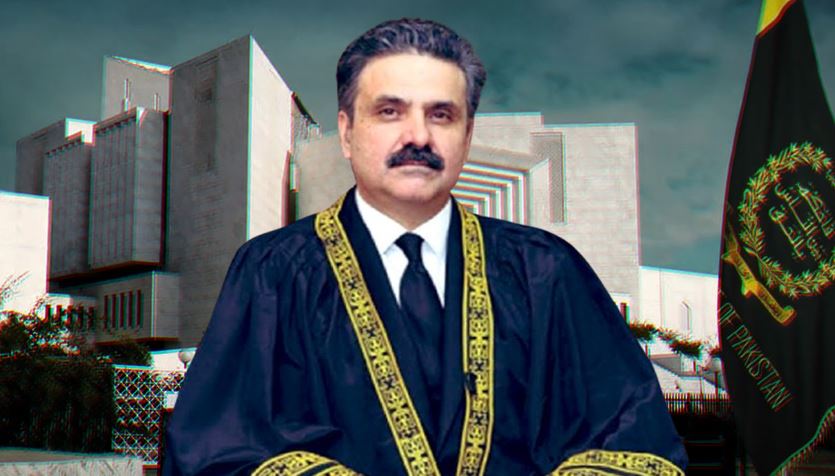Mudassir Rizwan
In a significant development in Pakistan’s judicial landscape, Justice Yahya Afridi, who ranks third in seniority within the Supreme Court, has been nominated by the newly constituted Special Parliamentary Committee to become the next Chief Justice of Pakistan. This nomination marks a pivotal moment for the judiciary, reflecting both Justice Afridi’s esteemed career and the procedural changes brought about by the 26th Constitutional Amendment.
Justice Yahya Afridi was born on January 23, 1965, in Dera Ismail Khan, a city known for its rich history and cultural heritage. His roots trace back to the prominent Afridi tribe, specifically the Adam Khel section, situated in the Kohat Frontier Region, where he is a resident of the quaint Village Babari Banda in District Kohat. Growing up in a family with a strong tradition of public service, Justice Afridi was undoubtedly molded by the values of integrity and commitment to community welfare from a young age. This background in public service is significant as it shapes his approach to justice and his commitment to serving the people of Pakistan.
His educational journey began at the prestigious Aitchison College in Lahore, an institution known for shaping some of the nation’s most capable leaders. He pursued higher education at Government College Lahore, obtaining a Bachelor of Arts degree in Political Science and Economics. His academic pursuits did not stop there; he later earned a Master of Arts in Economics from Punjab University, Lahore. This solid educational foundation equipped him with a comprehensive understanding of socio-economic issues, which he would later bring into his legal career.
Justice Afridi’s commitment to legal excellence propelled him to the United Kingdom, where he was awarded a Commonwealth Scholarship. He attended Jesus College at the University of Cambridge, completing his LL.M., which laid the groundwork for his legal acumen and broadened his international perspective on jurisprudence. His participation in the Young Commonwealth Lawyers program at the Institute of Legal Studies in London further honed his skills, preparing him for the challenges that lay ahead in his legal career.
Upon returning to Pakistan, Justice Afridi initiated his career in private practice in Peshawar. Simultaneously, he found passion in academia and took on a lecturing position at Khyber Law College, University of Peshawar. As an educator, he imparted knowledge in International Law, Labour Law, and Administrative Law, nurturing future legal minds. His academic contributions mirrored his practical experiences, allowing him to merge theory with practice seamlessly.
In 1990, Afridi was enrolled as an advocate of the High Court, marking the start of his formal legal career. His dedication and expertise led him to represent the province of Khyber Pakhtunkhwa as an Assistant Advocate General and fulfill responsibilities as a Federal Counsel for the Government of Pakistan, showcasing his versatility and unwavering commitment to public service.
Justice Afridi’s journey took a pivotal turn in 2010 when he was elevated to the Bench of the Peshawar High Court as an Additional Judge. His confirmation as a permanent judge occurred on March 15, 2012, reinforcing his commitment to judicial duties. His historical appointment as the Chief Justice of the Peshawar High Court, on December 30, 2016, marked a significant milestone, as he became the first judge from the Federally Administered Tribal Area to occupy this office. Justice Afridi served diligently in this capacity until his elevation to the Supreme Court of Pakistan on June 28, 2018.
The recent nomination by the Special Parliamentary Committee follows the implementation of the 26th Constitutional Amendment, which has notably altered the appointment process for the chief justice. The amendment, among other changes, now requires the recommendation of the Special Parliamentary Committee for the appointment of the top judge, which selects from the three most senior judges, requiring a two-thirds majority for confirmation. This is a significant departure from the previous process where the sitting Chief Justice would have been succeeded automatically by the most senior judge.
The committee comprises a diverse group of senators representing various political parties, including Azam Nazeer Tarar from the Pakistan Muslim League-Nawaz (PML-N), Farooq H. Naek from the Pakistan Peoples Party (PPP), Syed Ali Zafar from Pakistan Tehreek-e-Insaf (PTI), and Kamran Murtaza from Jamiat Ulema-e-Islam-Fazl (JUI-F). This diversity ensures a balanced decision-making process, reflecting the current political dynamics in the country.
The necessity of acting swiftly has emerged as a crucial factor in this nomination process. The Special Parliamentary Committee is tasked with completing the nomination within a tight timeframe. The incumbent Chief Justice, Isa, is set to retire on October 25, prompting the committee to adhere to a strict deadline of three days to finalize their decision. According to the constitutional amendment, this process must be undertaken not later than 14 days prior to the retirement of the sitting Chief Justice, underscoring the urgency and significance of the committee’s current undertaking.
Justice Yahya Afridi’s nomination as the next Chief Justice of Pakistan not only reflects his vast experience and dedication to the judiciary but also signifies a pivotal shift in how judicial appointments will be handled moving forward. His appointment holds promise for a judicial system undergoing transformation, and his leadership may pave the way for reforms aimed at enhancing judicial independence and integrity.
As Pakistan anticipates his ascension to this critical position, the nation looks forward to how Justice Afridi’s vision and values will shape the future of justice in the country.
















